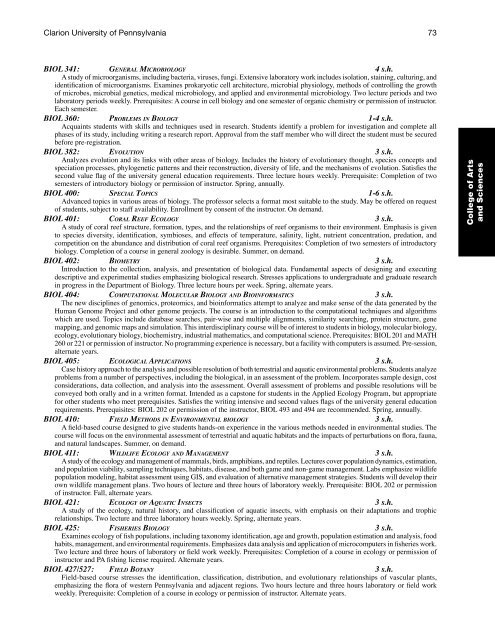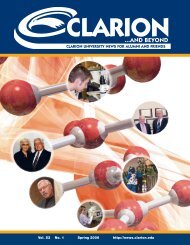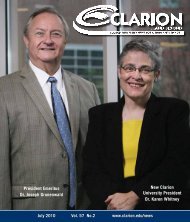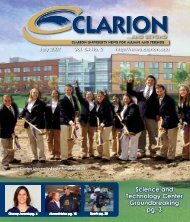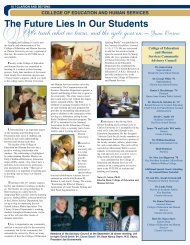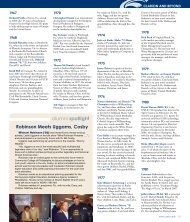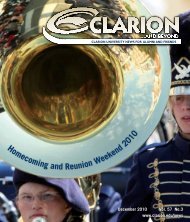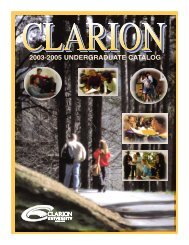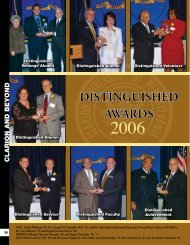Undergraduate - Clarion University
Undergraduate - Clarion University
Undergraduate - Clarion University
- No tags were found...
You also want an ePaper? Increase the reach of your titles
YUMPU automatically turns print PDFs into web optimized ePapers that Google loves.
<strong>Clarion</strong> <strong>University</strong> of Pennsylvania 73BIOL 341: General Microbiology 4 s.h.A study of microorganisms, including bacteria, viruses, fungi. Extensive laboratory work includes isolation, staining, culturing, andidentification of microorganisms. Examines prokaryotic cell architecture, microbial physiology, methods of controlling the growthof microbes, microbial genetics, medical microbiology, and applied and environmental microbiology. Two lecture periods and twolaboratory periods weekly. Prerequisites: A course in cell biology and one semester of organic chemistry or permission of instructor.Each semester.BIOL 360: Problems in Biology 1-4 s.h.Acquaints students with skills and techniques used in research. Students identify a problem for investigation and complete allphases of its study, including writing a research report. Approval from the staff member who will direct the student must be securedbefore pre-registration.BIOL 382: Evolution 3 s.h.Analyzes evolution and its links with other areas of biology. Includes the history of evolutionary thought, species concepts andspeciation processes, phylogenetic patterns and their reconstruction, diversity of life, and the mechanisms of evolution. Satisfies thesecond value flag of the university general education requirements. Three lecture hours weekly. Prerequisite: Completion of twosemesters of introductory biology or permission of instructor. Spring, annually.BIOL 400: Special Topics 1-6 s.h.Advanced topics in various areas of biology. The professor selects a format most suitable to the study. May be offered on requestof students, subject to staff availability. Enrollment by consent of the instructor. On demand.BIOL 401: Coral Reef Ecology 3 s.h.A study of coral reef structure, formation, types, and the relationships of reef organisms to their environment. Emphasis is givento species diversity, identification, symbioses, and effects of temperature, salinity, light, nutrient concentration, predation, andcompetition on the abundance and distribution of coral reef organisms. Prerequisites: Completion of two semesters of introductorybiology. Completion of a course in general zoology is desirable. Summer, on demand.BIOL 402: Biometry 3 s.h.Introduction to the collection, analysis, and presentation of biological data. Fundamental aspects of designing and executingdescriptive and experimental studies emphasizing biological research. Stresses applications to undergraduate and graduate researchin progress in the Department of Biology. Three lecture hours per week. Spring, alternate years.BIOL 404: Computational Molecular Biology and Bioinformatics 3 s.h.The new disciplines of genomics, proteomics, and bioinformatics attempt to analyze and make sense of the data generated by theHuman Genome Project and other genome projects. The course is an introduction to the computational techniques and algorithmswhich are used. Topics include database searches, pair-wise and multiple alignments, similarity searching, protein structure, genemapping, and genomic maps and simulation. This interdisciplinary course will be of interest to students in biology, molecular biology,ecology, evolutionary biology, biochemistry, industrial mathematics, and computational science. Prerequisites: BIOL 201 and MATH260 or 221 or permission of instructor. No programming experience is necessary, but a facility with computers is assumed. Pre-session,alternate years.BIOL 405: Ecological Applications 3 s.h.Case history approach to the analysis and possible resolution of both terrestrial and aquatic environmental problems. Students analyzeproblems from a number of perspectives, including the biological, in an assessment of the problem. Incorporates sample design, costconsiderations, data collection, and analysis into the assessment. Overall assessment of problems and possible resolutions will beconveyed both orally and in a written format. Intended as a capstone for students in the Applied Ecology Program, but appropriatefor other students who meet prerequisites. Satisfies the writing intensive and second values flags of the university general educationrequirements. Prerequisites: BIOL 202 or permission of the instructor, BIOL 493 and 494 are recommended. Spring, annually.BIOL 410: Field Methods in Environmental biology 3 s.h.A field-based course designed to give students hands-on experience in the various methods needed in environmental studies. Thecourse will focus on the environmental assessment of terrestrial and aquatic habitats and the impacts of perturbations on flora, fauna,and natural landscapes. Summer, on demand.BIOL 411: Wildlife Ecology and Management 3 s.h.A study of the ecology and management of mammals, birds, amphibians, and reptiles. Lectures cover population dynamics, estimation,and population viability, sampling techniques, habitats, disease, and both game and non-game management. Labs emphasize wildlifepopulation modeling, habitat assessment using GIS, and evaluation of alternative management strategies. Students will develop theirown wildlife management plans. Two hours of lecture and three hours of laboratory weekly. Prerequisite: BIOL 202 or permissionof instructor. Fall, alternate years.BIOL 421: Ecology of Aquatic Insects 3 s.h.A study of the ecology, natural history, and classification of aquatic insects, with emphasis on their adaptations and trophicrelationships. Two lecture and three laboratory hours weekly. Spring, alternate years.BIOL 425: Fisheries Biology 3 s.h.Examines ecology of fish populations, including taxonomy identification, age and growth, population estimation and analysis, foodhabits, management, and environmental requirements. Emphasizes data analysis and application of microcomputers in fisheries work.Two lecture and three hours of laboratory or field work weekly. Prerequisites: Completion of a course in ecology or permission ofinstructor and PA fishing license required. Alternate years.BIOL 427/527: Field Botany 3 s.h.Field-based course stresses the identification, classification, distribution, and evolutionary relationships of vascular plants,emphasizing the flora of western Pennsylvania and adjacent regions. Two hours lecture and three hours laboratory or field workweekly. Prerequisite: Completion of a course in ecology or permission of instructor. Alternate years.pages i-viiCollege of Artsand Sciences


